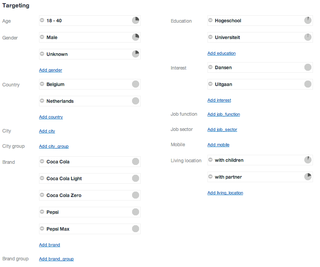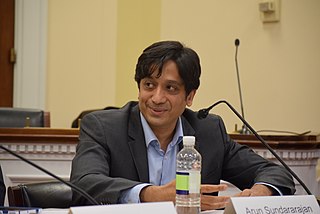A recommender system, or a recommendation system, is a subclass of information filtering system that provides suggestions for items that are most pertinent to a particular user. Recommender systems are particularly useful when an individual needs to choose an item from a potentially overwhelming number of items that a service may offer.
Click fraud is a type of fraud that occurs on the Internet in pay-per-click (PPC) online advertising. In this type of advertising, the owners of websites that post the ads are paid based on how many site visitors click on the ads. Fraud occurs when a person, automated script, computer program or an auto clicker imitates a legitimate user of a web browser, clicking on such an ad without having an actual interest in the target of the ad's link in order to increase revenue. Click fraud is the subject of some controversy and increasing litigation due to the advertising networks being a key beneficiary of the fraud.
Pay-per-click (PPC) is an internet advertising model used to drive traffic to websites, in which an advertiser pays a publisher when the ad is clicked.

The Courant Institute of Mathematical Sciences is the mathematics research school of New York University (NYU). Founded in 1935, it is named after Richard Courant, one of the founders of the Courant Institute and also a mathematics professor at New York University from 1936 to 1972, and serves as a center for research and advanced training in computer science and mathematics. It is located on Gould Plaza next to the Stern School of Business and the economics department of the College of Arts and Science.
Personalization consists of tailoring a service or product to accommodate specific individuals, sometimes tied to groups or segments of individuals. Personalization requires collecting data on individuals, including web browsing history, web cookies, and location. Companies and organizations use personalization to improve customer satisfaction, digital sales conversion, marketing results, branding, and improved website metrics as well as for advertising. Personalization is a key element in social media and recommender systems. Personalization affects every sector of society—work, leisure, and citizenship.

Targeted advertising is a form of advertising, including online advertising, that is directed towards an audience with certain traits, based on the product or person the advertiser is promoting. These traits can either be demographic with a focus on race, economic status, sex, age, generation, level of education, income level, and employment, or psychographic focused on the consumer values, personality, attitude, opinion, lifestyle and interest. This focus can also entail behavioral variables, such as browser history, purchase history, and other recent online activities. The process of algorithm targeting eliminates waste.

Jennifer Tour Chayes is dean of the college of computing, data science, and society at the University of California, Berkeley. Before joining Berkeley, she was a technical fellow and managing director of Microsoft Research New England in Cambridge, Massachusetts, which she founded in 2008, and Microsoft Research New York City, which she founded in 2012.

Yann André LeCun is a Turing Award winning French computer scientist working primarily in the fields of machine learning, computer vision, mobile robotics and computational neuroscience. He is the Silver Professor of the Courant Institute of Mathematical Sciences at New York University and Vice-President, Chief AI Scientist at Meta.

Arun Sundararajan is the NEC Faculty Fellow, Professor of Technology, Operations, and Statistics and a Doctoral Coordinator at the Stern School of Business, New York University. For 2010–12, he is the Distinguished Academic Fellow at the Center for IT and the Networked Economy, Indian School of Business. Sundararajan is an expert on the economics of digital goods and network effects. He also conducts research about network science and the socioeconomic transformation of India.
Panagiotis G. Ipeirotis is a professor and George A. Kellner Faculty Fellow at the Department of Technology, Operations, and Statistics at Leonard N. Stern School of Business of New York University.
Kristen A. Sosulski is an American university business professor and administrator. She joined New York University Stern School of Business in 2011. She serves as the Executive Director for the Learning Science Lab and Clinical Associate Professor of Technology, Operations and Statistics. Sosulski also teaches for the Master of Science in Business Analytics Program for Executives (MSBA), which is jointly hosted by NYU Stern and NYU Shanghai.
Anindya Ghose is an Indian-born American academic, and the Heinz Riehl Chair Professor of Business at New York University's Stern School of Business and the director of the Masters of Business Analytics program at NYU Stern. He has been a Visiting Professor at the Wharton School of Business. He is the author of TAP: Unlocking The Mobile Economy which is a double winner in the 2018 Axiom Business Book Awards and has been translated into five languages. He is a Leonard Stern Faculty Scholar with an MBA scholarship named after him. He has been a Visiting Professor at the Wharton School of Business. In 2014 he was named by the blog Poets and Quants as one of the "Top 40 Professors Under 40 Worldwide" and by Analytics Week as one of the "Top 200 Thought Leaders in Big Data and Business Analytics". In 2017 he was recognized by Thinkers50 as one of the Top 30 Management Thinkers globally most likely to shape the future of how organizations are managed and led in the next generation. Thinkers50 also bestowed the Distinguished Achievement Award Nomination for 'Digital Thinking' in 2017. In 2019, he was recognized by Web of Science citation Index in the top 1% of researchers selected for their significant influence in their fields over a 10-year period (2008-2018). He is a recipient of the prestigious INFORMS ISS Distinguished Fellow Award, given to recognize individuals who (i) have made outstanding intellectual contributions to the discipline with publications that have made a significant impact on theory, research, and practice and (ii) intellectual stewardship of the field as reflected in the mentoring of doctoral students and young researchers. His rise from assistant to full professor in 8.5 years at NYU Stern is widely regarded as one of the fastest in the history of the entire Information Systems, operations and Marketing academic disciplines in business schools globally.

Salvatore J. Stolfo is an academic and professor of computer science at Columbia University, specializing in computer security.
Claudio Silva is a Brazilian American computer scientist and data scientist. He is a professor of computer science and engineering at the New York University Tandon School of Engineering, the head of disciplines at the NYU Center for Urban Science and Progress (CUSP) and affiliate faculty member at NYU's Courant Institute of Mathematical Sciences. He co-developed the open-source data-exploration system VisTrails with his wife Juliana Freire and many other collaborators. He is a former chair of the executive committee for the IEEE Computer Society Technical Committee on Visualization and Graphics.
Nasir Memon is a computer scientist based in Brooklyn, New York. Memon is a professor and chair of the New York University Tandon School of Engineering computer science and engineering department and affiliate faculty at the computer science department in the Courant Institute of Mathematical Sciences at New York University. He is also the Department Head of NYU Tandon Online, the online learning unit of the school. He introduced cyber security studies to New York University Tandon School of Engineering, making it one of the first schools to implement the program at the undergraduate level. Memon holds twelve patents in image compression and security. He is the founding director of the Center for Interdisciplinary Studies in Security and Privacy (CRISSP) and CRISSP Abu Dhabi. In 2002, Memon founded Cyber Security Awareness Week (CSAW), an annual conference where tens of thousands of students compete in events and learn skills in cyber security Memon is also co-founder of Digital Assembly, a software company that develops digital forensics and data recovery and Vivic, a company that produces malware detection software. Memon has published over 250 articles in journals and conferences and has contributed to articles regarding cyber security in magazines such as Crain’s New York Business, Fortune, and USA Today. His research has been featured in NBC Nightly News, The New York Times, MIT Review, Wired.Com, and New Science Magazine.

Scott Galloway is a clinical professor of marketing at the New York University Stern School of Business, public speaker, author, podcast host, and entrepreneur.

Alex Stamos is a Greek American computer scientist and adjunct professor at Stanford University's Center for International Security and Cooperation. He is the former chief security officer (CSO) at Facebook. His planned departure from the company, following disagreement with other executives about how to address the Russian government's use of its platform to spread disinformation during the 2016 U.S. presidential election, was reported in March 2018.

Ronny Hadani is an Israeli-American mathematician, specializing in representation theory and harmonic analysis, with applications to signal processing. He is known for developing Orthogonal Time Frequency and Space (OTFS) modulating techniques, a method used for making wireless 5G communications faster, that is also being considered for use in 6G technology. The technology is being used by several wireless 5G related companies and Cohere Technologies, a company he has co-founded.
Jarosław Duda, also known as Jarek Duda, is a Polish computer scientist and an assistant professor at the Institute of Computer Science and Computational Mathematics of the Jagiellonian University in Kraków. He is known as the inventor of asymmetric numeral systems (ANS), a family of entropy encoding methods widely used in data compression.








